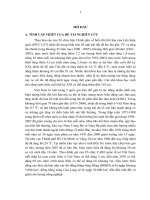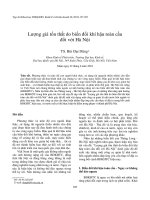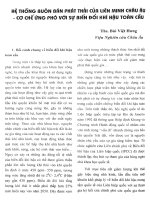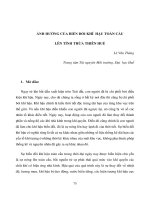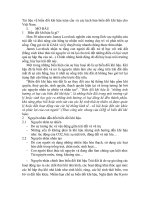Báo cáo của IPCC về biến đổi khí hậu toàn cầu
Bạn đang xem bản rút gọn của tài liệu. Xem và tải ngay bản đầy đủ của tài liệu tại đây (151.3 KB, 3 trang )
<span class='text_page_counter'>(1)</span><div class='page_container' data-page=1>
<b>Do Not Cite, Quote or Distribute</b>
<b>IPCC Secretariat </b>
c/o WMO · 7 bis, Avenue de la Paix · C.P: 2300 · CH-1211 Geneva 2 · Switzerland
telephone +41 22 730 8208 / 54 / 84 · fax +41 22 730 8025 / 13 · email · www.ipcc.ch
2013/20/PR
<b>IPCC PRESS RELEASE </b>
27 September 2013
<b>Human influence on climate clear, IPCC report says </b>
STOCKHOLM, 27 September - <b>Human influence on the climate system is clear. This is evident </b>
<b>in most regions of the globe, a new assessment by the Intergovernmental Panel on Climate </b>
<b>Change (IPCC) concludes.</b>
It is extremely likely that human influence has been the dominant cause of the observed warming
since the mid-20th century. The evidence for this has grown, thanks to more and better
observations, an improved understanding of the climate system response and improved climate
models.
<b>Warming in the climate system is unequivocal</b> and since 1950 many changes have been
observed throughout the climate system that are unprecedented over decades to millennia. Each of
the last three decades has been successively warmer at the Earth’s surface than any preceding
decade since 1850, reports the Summary for Policymakers of the IPCC Working Group I
assessment report, <i>Climate Change 2013: the Physical Science Basis</i>, approved on Friday by
member governments of the IPCC in Stockholm, Sweden.
“Observations of changes in the climate system are based on multiple lines of independent
evidence. Our assessment of the science finds that the atmosphere and ocean have warmed, the
amount of snow and ice has diminished, the global mean sea level has risen and the concentrations
of greenhouse gases have increased,” said Qin Dahe, Co-Chair of IPCC Working Group I.
</div>
<span class='text_page_counter'>(2)</span><div class='page_container' data-page=2>
- 2 -
Co-Chair Thomas Stocker concluded: “As a result of our past, present and expected future
emissions of CO2, we are committed to climate change, and effects will persist for many centuries
even if emissions of CO2 stop.”
Rajendra Pachauri, Chair of the IPCC, said: “This Working Group I Summary for Policymakers
provides important insights into the scientific basis of climate change. It provides a firm foundation
for considerations of the impacts of climate change on human and natural systems and ways to
meet the challenge of climate change.” These are among the aspects assessed in the contributions
of Working Group II and Working Group III to be released in March and April 2014. The IPCC Fifth
Assessment Report cycle concludes with the publication of its Synthesis Report in October 2014.
“I would like to thank the Co-Chairs of Working Group I and the hundreds of scientists and experts
who served as authors and review editors for producing a comprehensive and scientifically robust
summary. I also express my thanks to the more than one thousand expert reviewers worldwide for
contributing their expertise in preparation of this assessment,” said IPCC Chair Pachauri.
The Summary for Policymakers of the Working Group I contribution to the IPCC Fifth Assessment
Report (WGI AR5) is available at www.climatechange2013.org or www.ipcc.ch.
<b>Key Findings </b>
See separate Fact Sheet of Headline Statements from the WGI AR5 Summary for Policymakers,
available at www.climatechange2013.org<b>. </b>
<b>Background </b>
Working Group I is co-chaired by Qin Dahe of the China Meteorological Administration, Beijing,
China, and Thomas Stocker of the University of Bern, Switzerland. The Technical Support Unit of
Working Group I is hosted by the University of Bern and funded by the Government of Switzerland.
At the 28th Session of the IPCC held in April 2008, the members of the IPCC decided to prepare a
Fifth Assessment Report (AR5). A Scoping Meeting was convened in July 2009 to develop the
scope and outline of the AR5. The resulting outlines for the three Working Group contributions to the
AR5 were approved at the 31st Session of the IPCC in October 2009.
The Summary for Policymakers of the IPCC WGI AR5 was approved at the Twelfth Session of IPCC
Working Group I meeting in Stockholm, Sweden, 23 to 26 September 2013 and was released on 27
September.
The Final Draft of the Working Group I report (version distributed to governments on 7 June 2013),
including the Technical Summary, 14 chapters and an Atlas of Global and Regional Climate
Projections, will be released online in unedited form on <b>Monday 30 September</b>. Following
copy-editing, layout, final checks for errors, and adjustments for changes in the Summary for
Policymakers, the full report of Working Group I will be published online in January 2014 and in
book form by Cambridge University Press a few months later.
The Working Group I assessment comprises some 2,500 pages of text and draws on millions of
observations and over 2 million gigabytes of numerical data from climate model simulations. Over
9,200 scientific publications are cited, more than three quarters of which have been published since
the last IPCC assessment in 2007.
</div>
<span class='text_page_counter'>(3)</span><div class='page_container' data-page=3>
- 3 -
IPCC uncertainty guidance note:
/>
<i>For more information, contact: </i>
IPCC Press Office, Email:
Jonathan Lynn, + 41 22 730 8066 or Werani Zabula, + 41 22 730 8120
IPCC Working Group I Media Contact, Email:
Pauline Midgley, +41 31 631 5620
</div>
<!--links-->
Tác động của biến đổi khí hậu toàn cầu và sự dâng cao của nước biển
- 58
- 1
- 11

